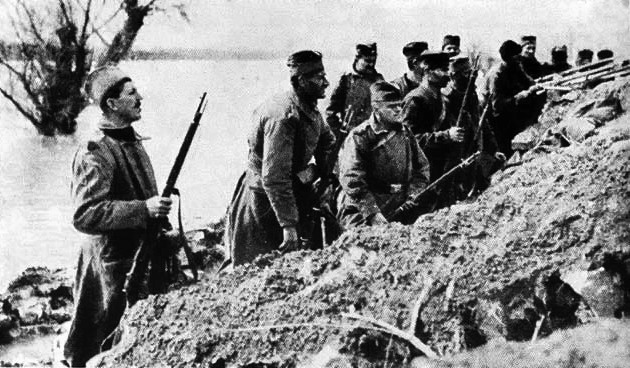raharris1973
Well-known member
1) What if the German armies on the left-wing in Alsace-Lorraine are weaker by multiple Divisions or Corps, forcing them to give ground in the face of French attack at the beginning of the war, and lengthening the western front lines even more? Which side is hurt worse and more likely to have its line snapped by being stretched out like this, Germany or France? Will either side, France or Germany, gain an opportunity, with wider gaps between formations, to cut off and destroy one, two, or more enemy armies in the late summer or fall 1914 campaign? Which one and why so?
2) What if the initial Russian advance into East Prussia does not panic Molke into sending two reserve Corps to East from the western front. What use are those forces put to in the west, and to what effect? In the east, these forces did not arrive in time to effect the battle of Tannenburg.
In the west, their departure probably did not change the outcome of the battle of the Marne, but might it alter the "race for the sea" or where the final trench line for the year falls? West of Calais would be significantly different from east of Calais, for example.
3. What if the Austro-Hungarians did a competent, Serbian-focused offensive deployment in 1914?
In the real world, Conrad fumbled the Austro-Hungarian deployment plans in 1914 and sent Austro-Hungarian armies strewn across the country shuttling between Serbia and the Russian front, and had both the Galician and Serbian offensives happened with insufficient troops in either place, with the Russian counter-attack subsequently annihilating the Austro-Hungarians in Galicia. What if Conrad had not come up with his complicated deployment plan and stuck to the initial operation of 2 armies rather than 1 against Serbia, giving decisive numerical superiority, while the troops in Galicia remain on the defensive in all of those forts that the Austrians spent so much money on.
Would the results be a great short-term success?
4. What if the Austro-Hungarians to the opposite (and what I think the Germans were hoping they would do), just keep minimal screening forces on the Serbian border and concentrate as much as possible against Russia, doing an offensive north into Russian Poland?
5. What if the French reverted from Joffre's offensive deployment and plan to Michel's defensive deployment and plan once it became clear that a) the Germans were invading through the Belgium, b) the British had declared war, and c) the Russians were attacking in the east. Could the French significantly reduce their losses by switching to the defensive early and deliberately? What would be the effects on the war longer term?
2) What if the initial Russian advance into East Prussia does not panic Molke into sending two reserve Corps to East from the western front. What use are those forces put to in the west, and to what effect? In the east, these forces did not arrive in time to effect the battle of Tannenburg.
In the west, their departure probably did not change the outcome of the battle of the Marne, but might it alter the "race for the sea" or where the final trench line for the year falls? West of Calais would be significantly different from east of Calais, for example.
3. What if the Austro-Hungarians did a competent, Serbian-focused offensive deployment in 1914?
In the real world, Conrad fumbled the Austro-Hungarian deployment plans in 1914 and sent Austro-Hungarian armies strewn across the country shuttling between Serbia and the Russian front, and had both the Galician and Serbian offensives happened with insufficient troops in either place, with the Russian counter-attack subsequently annihilating the Austro-Hungarians in Galicia. What if Conrad had not come up with his complicated deployment plan and stuck to the initial operation of 2 armies rather than 1 against Serbia, giving decisive numerical superiority, while the troops in Galicia remain on the defensive in all of those forts that the Austrians spent so much money on.
Would the results be a great short-term success?
4. What if the Austro-Hungarians to the opposite (and what I think the Germans were hoping they would do), just keep minimal screening forces on the Serbian border and concentrate as much as possible against Russia, doing an offensive north into Russian Poland?
5. What if the French reverted from Joffre's offensive deployment and plan to Michel's defensive deployment and plan once it became clear that a) the Germans were invading through the Belgium, b) the British had declared war, and c) the Russians were attacking in the east. Could the French significantly reduce their losses by switching to the defensive early and deliberately? What would be the effects on the war longer term?




